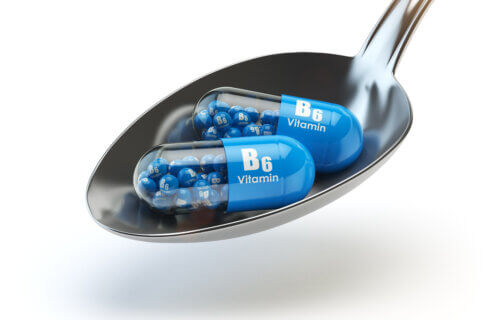
READING, England — Taking high-dose vitamin B6 supplements may help to reduce feelings of anxiety and depression, a new study reveals. Researchers from the University of Reading in England report that young adults taking a dose 50 times the recommended daily dose reported feeling less anxious and depressed after a month.
What is vitamin B6?
Vitamin B6 helps the body turn protein and carbohydrates into energy and it also plays an important role in the nervous system. It also increases the body’s production of GABA (Gamma-Aminobutyric Acid), a chemical that blocks impulses between nerve cells in the brain.
Vitamin B6 is found naturally in a variety of foods, including salmon, tuna, chickpeas, and bananas.
“The functioning of the brain relies on a delicate balance between the excitatory neurons that carry information around and inhibitory ones, which prevent runaway activity,” says Dr. David Field from the University of Reading in a media release. “Recent theories have connected mood disorders and some other neuropsychiatric conditions with a disturbance of this balance, often in the direction of raised levels of brain activity. Vitamin B6 helps the body produce a specific chemical messenger that inhibits impulses in the brain, and our study links this calming effect with reduced anxiety among the participants.”
READ: 5 Studies That Suggest Multivitamins Are Not Improving Your Health
The study provides evidence lacking in previous studies as to what exactly drives the stress-reducing effects of marmite and multivitamins.
More than 300 participants took either a placebo or Vitamin B6 or B12 supplements at 50 times the recommended amount – around 70mg. Each participant took one tablet a day with food. Vitamin B12 had little effect compared to the placebo, but B6 showed a statistically reliable difference.
Is there a risk from taking too much?
Visual tests at the end of the trial confirmed the raised levels of GABA in participants taking Vitamin B6, supporting the hypothesis that the supplements reduced anxiety.
The team also detected subtle but harmless changes in visual performance, consistent with controlled levels of brain activity. Health officials in the United Kingdom recommend that people do not take too high a dose – more than 200mg a day – as it can lead to a loss of feeling in the arms and legs. In a few cases, this has become permanent in people who have taken very large doses for several months.
“Many foods, including tuna, chickpeas and many fruits and vegetables, contain Vitamin B6. However, the high doses used in this trial suggest that supplements would be necessary to have a positive effect on mood,” Dr. Field continues. “It is important to acknowledge that this research is at an early stage and the effect of Vitamin B6 on anxiety in our study was quite small compared to what you would expect from medication. However, nutrition-based interventions produce far fewer unpleasant side effects than drugs, and so in the future people might prefer them as an intervention.
“To make this a realistic choice, further research is needed to identify other nutrition-based interventions that benefit mental wellbeing, allowing different dietary interventions to be combined in future to provide greater results,” the study author concludes. “One potential option would be to combine Vitamin B6 supplements with talking therapies such as Cognitive Behavioral Therapy to boost their effect.”
The study is published in the journal Human Psychopharmacology: Clinical and Experimental.
South West News Service writer Danny Halpin contributed to this report.

But i just read where vitamins are worthless and a waste of money. Big pharma wouldnt lie to me.
Could thus be why Red Bull & other B6 loaded energy drinks are so popular? I have no doubt that Vitamin B6 does something, in my case it dulls headaches and other pain, and does serve to reduce anxiety.
At the same time I’ve seen people who consume multiple drinks per day and have no doubt that, amongst other things, kidney damage is being done.
Including chickpea flour in your daily diet is good way to boost your Vitamin B6 levels.
Nonsense. This is called an active placebo. Get a high enough dose of something to see some marginal effect like your pee turning yellow or your skin tingles, and you’ve got the perfect recipe for “proof” that your medication works. This is how many pharmaceautical-backed studies work.
I recently ran out of vitamin B-12, so I substituded two B-6 capsules. Seems logical and mathematically correct to me. ????
Study design could have improved by testing and specifying pre therapy serum Vit B6 and Vit B12 serum levels in the participants of both arms of the trial compared to normal range. The results would have been more interesting if the clinical outcomes in depression scores were affected by the VitB levels prior to taking the vitamin.
Thanks for parroting the article Cheryl. Article already said that
I used to B6, before I grew up.
P*ss off with your autostarting ads
Since this study was on a small sample scale, the findings are inconclusive and you are doing a real disservice to the public. Once laypeople read this, the whole pack will storm the health food stores and stock up on cases of vitamin B 6. You can write as many disclaimers as you do but that does not take away your disservice and misleading information to the public. The public will NOT see this as information only. They will see it as gospel truth. So plzzzzz, wait until you conduct an appropriate size sample, peer reviewed, double blind study before you even begin to think about publishing your results. The vitamin industry is sooooo happy now. They probably gave a “small” donation.????????♂️????. So….to all you vulnerable, anxious people out there, including me, don’t waste your money. The health food industry is no better than big pharma.